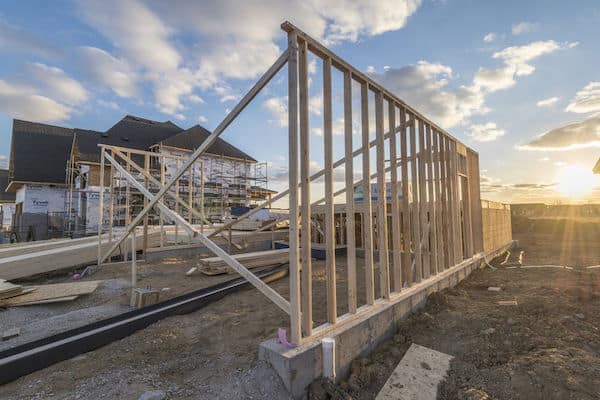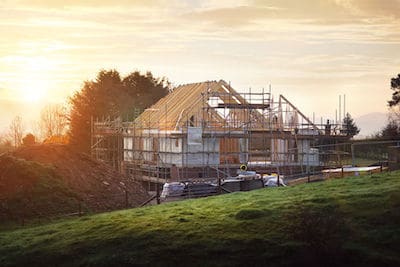Building a home can often be an overwhelming process. There are people to hire, purchases to be made, planning to be done, and so much more! To those who have no experience building a home, building one can easily be a very foreign or tedious thing. But who do you turn to for guidance during this process? General Contractors are there to save the day!
If you’re starting to build a house, you may be wondering who it is that you can hire. You want to put the future of your home, the place that will become central to your life, in the hands of someone who knows what they are doing and is capable. A person who meets these requirements is a general contractor. But what do they specifically do, and how can they help you?
Do General Contractors Build Houses?
So, do general contractors build houses? In short, yes. General Contractors can help build your home. They work with you to construct your project. When you decide to create your own home, it is generally best to do so with the help and through a general contractor. However, many states allow homeowners to act as a contractor for their own home. Yet, very few people are qualified to work as their own general contractor.
If you were to be your own general contractor, you’d have to manage various aspects of your project. You’d have to schedule tasks or projects and subcontractors in the correct order as well as inspections. You’d have to have an understanding of the building code. And you’d have to network subcontractors to find those you can rely on for trustworthy execution to your vision. So, instead of dealing with those things on your own, it’s simpler and stress-relieving to hire a general contractor to bring your home to life!
What General Contractors Do 
In general, they manage a team of subcontractors to help do various types of construction in your home. They handle all aspects of a project, including hiring and supervising subcontractors, obtaining building permits, and scheduling inspections.
They help keep a proper schedule and get inspections throughout the entirety of building your home. They make sure that anything done during residential construction process is done correctly. And they have already built a network of subcontractors and know which one will best suit your home’s needs!
A general contractor also helps estimate the entire project, review plans to root out any potential future problems before they happen, troubleshoot, and guide the job to completion at the quoted price.
Hiring a General Contractor
First and foremost, you’ll want to know what you want before scouting out the right general contractor for your project. You don’t necessarily need to have every detail filled out in your mind, but having a direction you’d like to go in will allow you to direct the home building project. Think about what you want the result to be and what your goals are.
When hiring a general contractor, you’ll first want to sit down or call them to get an estimate for your project. Once you’ve narrowed down your options, you can ask them a few questions about building your home. Some question to consider include:
- How many projects similar to mine have you completed? See how familiar they are with your type of project.
- Will my project require a permit? A contractor will know the necessary permits needed before even starting to work on your project. There may be different permits based on your county, city, or town.
- Do you have a list of references?
- What type of insurance do you carry? Contracts generally have personal liability, worker’s compensation, and property damage coverage. These should be up-to-date.
- Will you be outsourcing subcontractors on this project? Sometimes it isn’t guaranteed that a general contractor will need to reach out to subcontractors depending on the type of job, but if they do, make sure they are also adequately insured.
Types of Subcontractors
There is a vast majority of subcontractors that can be hired to help complete a project. It’s important to understand the types of contractors that will be working at your house. A general contractor will deal with hiring subcontractors and will have an understanding of who will best fit the job. Commonly, subcontractors install or build the following:
 Security System Installation
Security System Installation- Carpeting
- HVAC
- Electrical Wiring
- Plumbing
- Technology
- Foundation
- Drywall
- Masonry
- Concrete
- Roofing
- Countertops
- Ceramic Tiling
- Flooring
- Painting and Wallcovering
- Landscaping
- Kitchen Cabinets
- Exterior Doors and Windows
- Framing
- Exterior Siding
- Interior Doors
- Finished Carpentry
Payment Options and a Written Agreement
When you hire a general contractor, talk about your payment options beforehand. For something as large as building a house, you’ll most likely arrange financing. For large projects, it’s common to pay 10% at contract signing, three payments of 25% evenly spaced out during the project’s duration, and finally, a check for the final 15% when the project has been completed to your satisfaction.
There is a limit to the amount of money a contractor can request as a down payment in some states. You can contact your local state or local consumer agency to determine what laws apply to you in the area in which you live. Making payments during the project that depends on the completion of specified amounts of work helps ensure your satisfaction with the outcome.
It’s essential you get a written contract. This can also vary by state. Even if your state doesn’t require a written contract, it’s best to ask for one. You’ll want to ensure that everything is clearly written and explained within the written agreement, including who is working on your project, what the project’s details are, where and when the project is to take place and the cost of your project.
The written agreement should also include the contractors’ contact information, the contractors’ obligation to obtain the necessary permits, how change orders are handled, a detailed list of materials, information about warranties covering materials and workmanship. It should also include details regarding what the contractor will and won’t do, any verbal promises made during conversation or calls, and a written statement of your right to cancel the contract within a set amount of time.
The Start of Your Project
Once you’ve got things settled with a general contractor, you’ll want to start preparing your home’s site. It’s a good idea to clear the building site of any brush or other debris, including up to at least 25 feet around the planned house perimeter. Have a surveyor state out the lot and indicate your property’s boundaries.
If the topography doesn’t allow for proper water flow across the site, adjust it. Ordering a dumpster to have on hand is helpful during large building projects. It’s also a good idea to have one or more portable toilets for the workers on-site and temporary utilities from the power company. These are all suggestions before you start your building project.
After Hiring a General Contractor
After you hire a general contractor, keep records of all related paperwork on your building project, including copies of the contract, change orders, correspondence, and payment records. Keeping a log and taking photographs during the job progress can turn out to be vital during or after your project, especially if you end up having a problem related to it. Make sure to sign a completion certificate when all the work outlined in the contract has been done to your satisfaction.
Working with a General Contractor
During the project, you’ll also want to watch for potential problems, keep an eye on safety, be clear about what you want and speak up if anything concerns you, make payments on time, track changes made, and document problems. Your cooperation as the client and visionary of your project will help guide the general contractor toward the end goal.
By keeping out a keen eye for potential problems and safety, you can readily bring up anything that makes you feel uncomfortable. This also applies to anything you want or don’t want to change. By working hand-in-hand with the general contractor, you can better enjoy the result!
After all the work is finished between you and the general contractor, you should leave the relationship feeling satisfied with the work they’ve done to achieve your dream home! Afterward, if you feel like they did a satisfactory job, you can even refer them to friends and family for future home projects!
